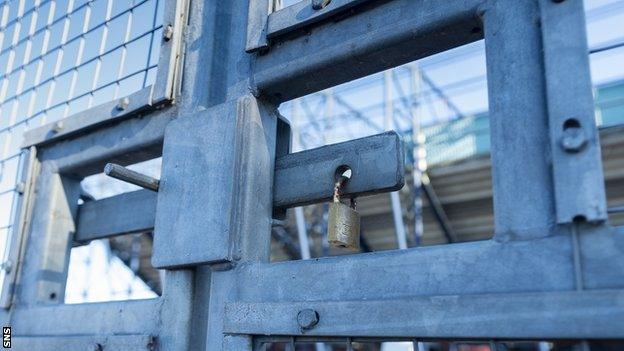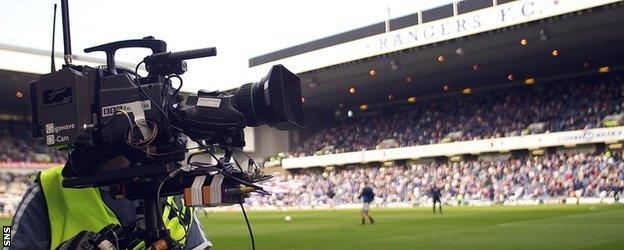Cost of living: What is true impact across Scottish football?
- Published

There are growing concerns rising cost of living prices could alienate some football fans
As clubs across Scotland prepare to re-open their turnstiles once again for the start of the new SPFL season, could some fans be facing the growing prospect of spending weekends elsewhere?
While football is viewed as an indispensable escape from everyday life for many, rising living costs are squeezing households across the country.
From increasing concerns of supporters to the effects on community schemes and academies, BBC Scotland finds out the true extent of the issue.
'We've been inundated with worried fans'
"There are some things we've got to buy and others we class as discretionary spending. Football, although it's close to a religion for some, has to go in that second category."
Stadiums almost act as a place of worship for fans, as football finance expert Kieran Maguire suggests, but rising bills and inflation have supporters weighing up their options.
"If families are struggling, they'll look to make cutbacks," Maguire adds. "Season tickets and things like club merchandise will become part of their attempts to do that until things feel more comfortable."
But despite the ongoing financial crisis, season ticket sales have been promising in Scotland. As expected, both Rangers and Celtic have sold out their allocated numbers while Hearts have done likewise after recording their highest numbers in modern times.
Steady sales may have been aided by the fact almost every Premiership club now offers an interest-free standing order option when it comes to purchasing, but with bills set to spike again later in the year, there are fears the worst is yet to come.
"We can't stress how strongly we're concerned about the short, medium and long-term future," Stuart Murphy, CEO of the Scottish Football Supporters Association (SFSA), tells BBC Scotland.
"Recently our mailbag has been inundated with worried fans. We feel there should be a more responsible attitude towards what's going on in the wider world in the interests of supporters.
"To be fair to clubs, a lot have frozen season ticket prices, but we've had fans say how they're in a situation where they can't buy season tickets because they need to feed their families."
'Kids are taking food home for their parents'

Almost a third of parents say the cost of living crisis will impact their ability to afford football for their kids
Out of all levels of football, grassroots may well be suffering the most damaging effects.
The Price to Play report, published in May, found 32% of Scottish parents said the cost of living crisis will impact their ability to afford football and a further 26% said they will not be able to afford it in the very near future.
Meanwhile, a project led by the SFSA to provide clubs with potential life-saving defibrillators has been "very difficult" to carry out due to pitch hire and basic equipment costs taking priority.
Motherwell FC Community Trust, who provide a range of schemes including grassroots teams and summer camps for kids, are experiencing a growing number of concerns from parents.
While the Trust will be faced with increased costs, as a charitable organisation it is in a fortunate position of funding allowing it to reduce costs and assist those most in need.
But "heart-breaking" scenes are becoming more frequent, with the demand for food provided at the Trust's activities "three times higher" than last year.
"There's been a huge impact and I don't think the worst has hit us yet," Dawn Middleton, general manager of the charitable organisation, tells BBC Scotland.
"Some days the kids can take leftovers home. When a seven or eight-year-old says they're taking food home for their parents, you just want to take them in the car and do their shopping. It's so wrong. We have to keep costs down for them.
"But what we have to realise is football won't be the only cutback. The swimming might have gone as well, the music lessons, the drama lessons. If we can be something that saves a sense of normality, then that's really important."
Another growing concern is the impact the financial crisis will have on academies. If kids cannot afford to play, they ultimately will not be drafted into youth set-ups.
"That's a worry," Middleton adds. "We as a charity need to address that. We can't have young children lost to the professional game."
Calls for 'common sense' in broadcasting
The concerns Murphy raises also stem from the way football is consumed on television.
For a Scottish fan to watch the national team and all the action involving their domestic side, they would need to fork out on several subscriptions.
Sky Sports are the exclusive broadcaster of the Scottish Premiership, BT Sport cover the Champions League, Europa League and Conference League, plus Premier Sports show the Scottish Cup and Scottish League Cup.
The most recent provider to come on the Scottish market is Viaplay, who will broadcast Scotland men's international matches from 2024 to 2028.
The Nordic streaming platform, set to launch in the UK this autumn, has recently taken over Premier Sports, meaning they will also acquire the rights to show both of Scotland's domestic cup competitions.

The SFSA has called for a "common sense" approach when it comes to broadcasting
Viaplay's CEO Anders Jensen has stressed the broadcaster will provide a "cost efficient" service for Scottish football fans in a "financially depressed" period.
"TV needs a review of the whole way it's put forward to supporters in Scotland," Murphy says.
"If you have a fuel crisis, away footfall will fall quite dramatically. It would make sense for TV companies to reach an agreement for fans to get access to some of these matches.
"Broadcasters have to be careful," Maguire adds. "They will meet resistance. If a new broadcaster comes into the market and doesn't pitch at the right price, they're not going to pick up new consumers."
How will clubs cope?
Most Scottish clubs do not hold anywhere near the same level of finance as other top European leagues, and with energy bills rising, Maguire cites a "horrendous" increase in the costs of floodlight use.
But cautious spending throughout the Covid-19 pandemic has provided a source of optimism.
"I expect to see clubs trying to work around the problems their fanbases are going to have to deal with," Maguire says. "We will see an impact in terms of club budgets, but one thing I have some comfort in is the fact Scottish clubs cut their cloth accordingly.
"They didn't overstretch themselves during the pandemic. You'll see caution when it comes to buying players, and if players and their representatives are going to try extract additional money in the form of higher wages, they're going to come up against a lot of resistance.
"The robust management of Scottish football in terms of finances is the one thing the country has going for it, and that should help secure the short-term future."

'I thought one day I'd be in that band': Ronnie Wood talks candidly about his life as a Rolling Stone
A telescope designed to unfold in space: Could it be the first to detect signs of life on a distant planet?
